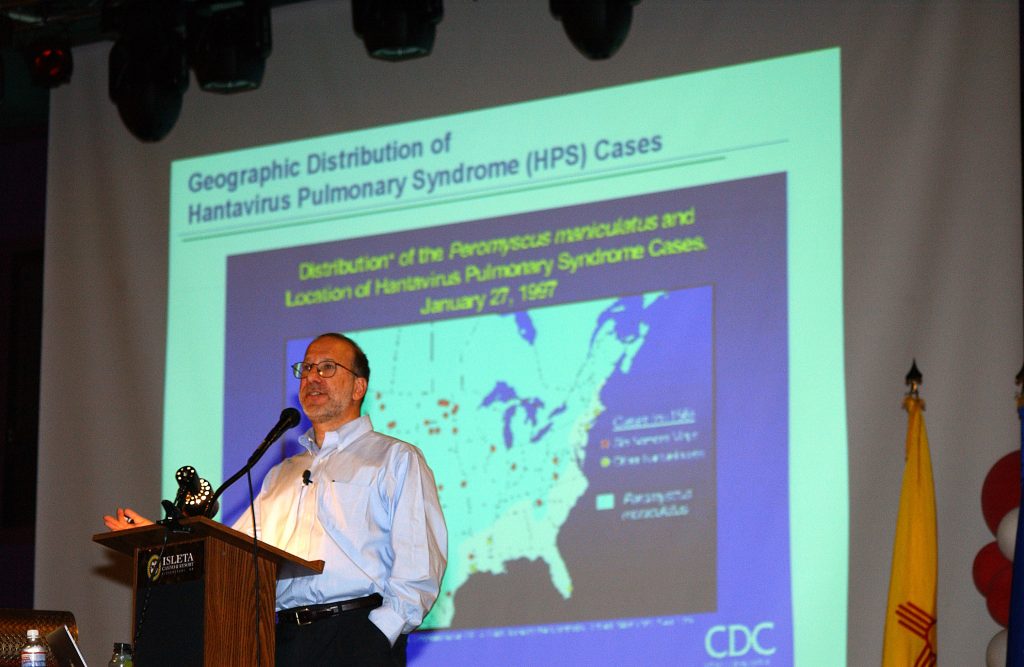ALBUQUERQUE, N.M. — A worldwide early-warning system that could alert international authorities of covert biological weapons research or use is part of a measure recently passed by the U.S. Senate and awaiting consideration by the U.S. House of Representatives.

The system was conceived by a scientist/physician at the U.S. Department of Energy’s Sandia National Laboratories.
The Senate voted unanimously on Aug. 1 to adopt the Global Pathogen Surveillance Act of 2002, Senate Bill 2487, which in part calls for the establishment of an online network through which doctors around the world can quickly report and obtain information about unusual symptomatic observations and disease diagnoses among their patients.
Such a system would provide a fast and pervasive method of monitoring epidemics as they emerge so nations hosting illegal research on biological pathogens can be confronted before they have a chance to use the germs as weapons, says Sandia senior scientist Alan Zelicoff, M.D.
Current disease-reporting systems rely on slow and belabored paper-based reporting procedures through public health officials, an approach that discourages doctors from reporting symptoms and that could delay public health responses to acts of bioterrorism, he says.
Local doctors could use an online network to immediately report unusual symptoms among individual patients. International organizations could then investigate suspicious clusters in a population that might be indicative of covert offensive biological weapon development programs, which can cause unintended localized outbreaks due to mishaps or open-air testing.
A quick reporting system also would provide the earliest possible warning of an offensive use of biological weapons against a population and could give public health officials extra time to contain an outbreak before it snowballs.
The system would have the added public health benefit of quickly identifying disease outbreaks not related to bioterrorism.
SB2487 sets aside $150 million over two years (FY2003 and FY2004), in part to begin equipping hospitals and clinics around the world with the computing and communications equipment needed to give local doctors access to such a network. The measure awaits consideration by the full U.S. House of Representatives.
The online surveillance system proposed in the bill is patterned after Zelicoff’s longtime cause, the Rapid Syndrome Validation Project (RSVP), a collaborative effort with the New Mexico Department of Health that will soon tie together more than 25 clinics in the state. (See https://newsreleases.sandia.gov/rsvp-system-deployed-along-u-s-mexican-border-proves-value-detects-two-disease-outbreaks/.)
Zelicoff rewrote language for portions of the Senate bill at the request of the bill’s sponsors following Zelicoff’s congressional testimony in March 2002.
The Senate accepted the bill with Zelicoff’s language mostly intact. (The full text of the bill is available at http://thomas.loc.gov/home/thomas.html.)
The bill, as written, signals a strategic shift in the way public health surveillance is done around the world, says Zelicoff.
A portion of the bill and related funding would provide previously unaffordable computing and communications equipment to clinics and hospitals in developing nations. It also calls for improved epidemiology-related training and laboratory equipment for developing nations.
It gives preference to governments that agree to provide early notification of epidemics and allow international organizations to investigate suspicious outbreaks.
Zelicoff, also a technical advisor to the U.S. team to the Biological Weapons Convention (BWC) protocol negotiations, says the approach could become part of future U.S. proposals to overhaul the BWC. The 1972 treaty has been ratified by some 150 nations but lacks an effective method of verifying that participating nations are complying.
Commenting about the bill in the Aug. 1 Congressional Record, Sen. Joe Biden, D-Del., said, “The more information shared under pathogen surveillance, the better protected the world is against surprise bioterrorist attacks and rapid natural epidemics . . . We cannot leave the rest of the world to fend for itself in combating biological weapons and infectious diseases if we are to ensure American security.”
Bill co-sponsor Sen. Jesse Helms, R-N.C., added, “I am particularly proud of the provisions of SB2487 that address the glaring need for syndrome surveillance . . .”
Adds Zelicoff: “When all is said and done, should would-be perpetrators of bioterror know that the effects of their attack would be blunted if not eliminated, they might well re-think their strategy in the first place. A multi-national cadre of clinicians and nurses, exchanging up-to-the-minute information, is our single best defense, and we have the resource — now — to so equip them.”
SB2487’s funding appropriations would be routed through the Department of State in consultation with the Department of Health and Human Services and Department of Defense.
